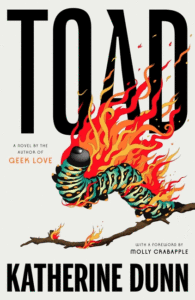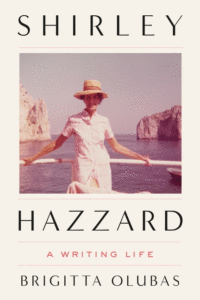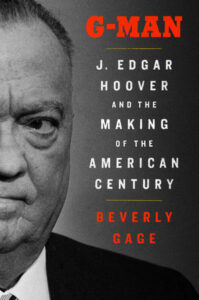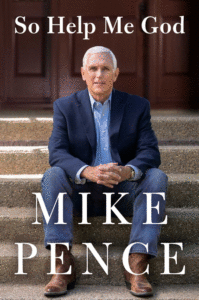
5 Book Reviews You Need to Read This Week
Hermione Hoby on Katherine Dunn, Justin Taylor on Cormac McCarthy, and More
Our basket of brilliant reviews this week includes Hermione Hoby on Katherine Dunn’s Toad, Justin Taylor on Cormac McCarthy’s The Passenger and Stella Maris, Jennifer Szalai on Mike Pence’s So Help Me God, Anthony Domestico on Brigitta Olubas’ Shirley Hazzard: A Writing Life, and Margaret Talbot on Beverly Gage’s G-Man.
Brought to you by Book Marks, Lit Hub’s “Rotten Tomatoes for books.”
*

“… a remarkable, disquieting, and judiciously revolting posthumous novel about, among other things, unrequited love … succeeds not by being incredible, but by being so credible. It is, definitively, a novel for grown-ups, not just because of the advanced age of its narrator—the ornery Sally Gunnar—but because a thrilling, subtle, and wholly persuasive adult anger animates the book. I believed every word … Despite its jumbled chronology, Toad tells a brutally straightforward story … beneath the bite and verve of its prose, Toad is attuned to the quietly tectonic nature of intimate relations, and things between these frenemies shift in strata and run deep … What a peculiar experience it is, then, both galling and gratifying, to read this book decades later, now that Roe v. Wade has been overturned. It’s not that Toad is exactly prescient—assaults on female autonomy are of course ongoing (the galling part), and concomitant female rage remains their warranted result (which explains much of what is gratifying.) But I wonder if Dunn had any idea how much her strange, savage, tender book would come to be protesting.”
–Hermione Hoby on Katherine Dunn’s Toad (4Columns)

“Is Cormac McCarthy our most minor major novelist or is he our most major minor novelist? The new books, unequal though they are in terms of quality, are his most ambitious and challenging work in decades. They do not readily yield a definitive answer to my question, but they do suggest that it may be as much on his mind as it has been on mine … After Blood Meridian he simplified the language and softened the violence in his books; his subsequent novels still boast sizable body counts, but there’s less glee in the killing, and corpses are radically less likely than heretofore to get scalped and/or fucked … McCarthy is hunting big game and he’s brought out the big guns to hunt with. What he has not done is provide anything resembling a plot through which to reify and explore these ideas in narrative. There is indeed, as the jacket of my galley copy promises in big bold letters, ‘A SUNKEN JET. NINE PASSENGERS. A MISSING BODY.’ And Bobby is indeed caught up in ‘a conspiracy beyond his understanding,’ but it’s hard to convey just how utterly vestigial, even irrelevant, this material is to anything resembling the novel’s real concerns. If Twin Peaks: The Return had you screaming at your TV to get Agent Cooper off the sidelines, or if you think late DeLillo has gotten elliptical to the point of incoherence, you’re going to end up throwing these books across the room … The truth is that The Passenger only fails to satisfy when it vamps as a thriller. That’s a promise that just won’t ever be made good. When the novel follows its Lynchian instincts—setting a long scene on a deserted oil rig off the coast of Pensacola, for instance, or allowing Bobby to encounter the Kid (or to dream that he did) on a stormy beach—then its power and pleasures are considerable. It is a novel of set pieces and soliloquies, images and ideas, at its best when refusing to be anything other than its moody, freaky self. Above all, it is a book of evocative surfaces, like a John Ashbery poem, where things we take at first to be windows turn out to be mirrors, and the radical alterity glimpsed in dark glass turns out to be ourselves … There’s no reason for Stella Maris to be this boring; but then, there’s no reason for it to beat all. Rather than punctuate The Passenger, Stella Maris made me second-guess the things I liked best about it, and left me dwelling rather more darkly than I otherwise might have on its lacunae and flaws, because elusiveness and opacity are one thing, but any writer who would publish these two books together on equal footing must just be throwing shit at the wall and hoping for the best.”
–Justin Taylor on Cormac McCarthy’s The Passenger and Stella Maris (Bookforum)
“The bulk of So Help Me God is given over to tracing his relationship with Trump, much of it in minute yet obfuscating detail … Not that Pence’s explanations amount to much more than self-serving spin … Some of Pence’s contortions are so elaborate that they’re worthy of Cirque du Soleil. A chapter on Covid gets especially creative. Trump’s bumbling, combative Covid briefings are depicted as wonderfully comforting, instead of utterly confounding … Pence, who presided over the White House’s troubled coronavirus task force, is relentlessly upbeat, despite a pandemic death toll of more than 377,000 Americans by the end of 2020 … The most obvious conclusion to draw from So Help Me God is that Pence continues to have political—perhaps presidential—ambitions and so finds himself in bit of a pickle. If he had refused to certify the vote, that would have been it for him—no matter what happened after that, he would forever be seen as Trump’s lackey. But since he did certify the election, he has to find a way to placate the Trump supporters he’ll inevitably need … Threading such a tiny needle seems impossible on the face of it, but if anybody has had the miraculous experience of failing upward, it’s Pence.”
–Jennifer Szalai on Mike Pence’s So Help Me God (The New York Times)

“To be sure, Hazzard knew the world in all its mineral coarseness. She grounded her exquisite style in earthly plots: petty jealousies; romantic betrayals; boring office jobs. Her fiction has an awareness of place and exhibits impressive geographical range, appropriate for a woman who was born in Australia but lived all over … Yet her writing is at its most characteristic when at its highest pitch, when her prose and the details it includes approach the condition of music, or poetry, or sculpture … This was one of Hazzard’s greatest gifts as a writer: to show how life, when seen through the prism of style, partakes of the monumentality of art. For Hazzard, to see life aesthetically was to see life as it really was. Her four novels and two collections of stories are filled with details distilled to perfection … if ever there were a writer who required a biographer of style and sensibility, it’s Shirley Hazzard. Everyone who knew her commented on her elegance and charm, her sense that beauty—beautiful books, beautiful conversations, beautiful landscapes—mattered more than anything…Lucky for Hazzard, she has found an ideal chronicler in Brigitta Olubas, whose Shirley Hazzard: A Writing Life is an exemplary work of biographical criticism … Olubas notes that Hazzard saw poetry as ‘a way of being human.’ She believed that how you read shaped how you encountered the world, and how you wrote emerged from how you had lived. As one character says in The Bay of Noon, ‘They had a notice, Please do not touch the paintings; they should forbid the paintings to touch you.’ In Hazzard’s life and work, the real and the aesthetic reach out to touch one another, always.”
–Anthony Domestico on Brigitta Olubas’ Shirley Hazzard: A Writing Life (The Baffler)

“…crisply written, prodigiously researched, and frequently astonishing … Hoover’s F.B.I., as the files established, had engineered a clandestine campaign aimed at ‘disrupting’ and ‘neutralizing’ left-wing and civil-rights organizations through the use of informants, smear campaigns, and callous, cunning plots to break up marriages, get people fired, and exacerbate political divisions … Previous accounts of how Hoover clung to his position for so long have tended to stress his capacity to intimidate, and even blackmail, Presidents. Gage certainly does not deny Hoover’s talent and taste for these dark arts, but she wants to emphasize a simpler explanation, one less flattering to America’s self-regard. For a very long time, most Americans admired Hoover … Hoover’s crepuscular hold over Presidents was tenacious. He served under eight of them, four Republicans and four Democrats, and, Gage makes clear, most were either beholden to him or scared of him, or both … There have been other big, ambitious biographies of Hoover, but G-Man is the first in nearly three decades. One advantage to writing about him now is that, in the realm of national security, revelations burble up over time, files get declassified, foia requests haul out unexpected specimens in their nets. But some of Gage’s freshest takes concern Hoover’s upbringing in a respectably middle-class but emotionally beleaguered family, and the formation of his racial attitudes in a college fraternity with a sentimental attachment to the Jim Crow South. Many of the book’s other sharp assessments come not from secret documents but from generally available historical sources that the author has read with close attention or particular nuance … Gage concludes, ‘Hoover did as much as any individual in government to contain and cripple movements seeking social justice, and thus to limit the forms of democracy and governance that might have been possible.’ That is a devastating assessment.”
–Margaret Talbot on Beverly Gage’s G-Man: J. Edgar Hoover and the Making of the American Century (The New Yorker)
Book Marks
Visit Book Marks, Lit Hub's home for book reviews, at https://bookmarks.reviews/ or on social media at @bookmarksreads.





















